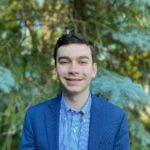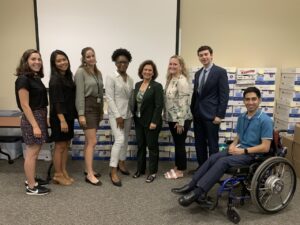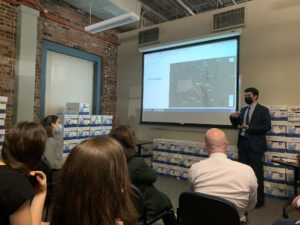Internship Offers Unique Experience in Data Analysis and Storytelling
Through a summer internship with the Rhode Island Department of State, Andrew Briden ’24 addressed issues through data analysis and developed data storytelling and presentation skills. Here, he reflects on his experience:
This summer, I had the amazing opportunity of being a summer fellow at the Rhode Island Department of State.

As I entered my freshman year, I was excited to explore different academic areas and try to figure out what I wanted to pursue. During spring semester, I worked with the Career and Life Design Center to find a summer opportunity that would involve thinking creatively to solve problems, in any discipline. I decided to apply for a Rhode Island Department of State fellowship, which pairs college students with different departments to work on a project solving an issue and then present the project findings at the conclusion of the summer.
On my first day, I was paired with a senior data analyst to be my mentor. I also worked closely with a data scientist, who guided me through the technical side of my daily work and programming. With both of these professionals and another fellow, we met weekly over lunch and had a book club, discussing Storytelling with Data by Cole Nussbaumer Knaflic. We even had a chance to connect with the author about our reading. I learned about the data team’s career journeys and what their daily work involves. One of my favorite parts of the summer was sitting in on the creation and release of a 2020 census dashboard, an initiative spearheaded by my mentor.

For my fellow project, which was my main focus, I was assigned to investigate business registration data on the city and state level, to see where both crossed over and why. With the guidance of the data scientist, I worked with, I embarked on ten weeks of programming to answer the question at hand. I began the process by merging and stacking hundreds of thousands of data entries. I then learned how to ‘clean’ data and standardize it throughout the data set to make it easier to compare. I created an algorithm to match different business entities, by researching and learning about a computer science concept called Levenshtein distance. At first, the project was daunting with my limited programming experience, but with the guidance of my mentor, and after breaking down data science concepts, I felt secure enough to approach these. In the process, I learned a tremendous amount about using programming and data science tools to answer questions.
One of my favorite parts of the fellowship was the weekly lunches with all the departments comprising the Office of the Secretary of State, including business services, elections, legislative advisors, communications, archives, and public information. I was also extremely lucky to have lunch with the Secretary of State Nellie Gorbea and her team. Learning about various facets of how the state government functions was amazing and personal, and I found myself constantly relating it back to the public policy course I had taken the semester before. I learned a lot from hearing about all the work people were doing and their efforts to continue to make things as transparent and modern as possible.
When I began my project, I was nervous that I would not find significant business registration data, but after ten

weeks, I discovered 351 matches on the state and city level. At the end of the summer, I was able to present my project to Secretary of State Gorbea and her executive team. Crafting the presentation was a formative part of the summer because I was able to learn how to best visualize data, using the Storytelling with Data book that my department gave me, and how to use mapping to display my findings. I learned that communicating your findings effectively is essential to data science projects.
In many ways, this fellowship exposed me to the power of using data to solve problems and answer questions. Throughout the summer I was constantly thinking about how I excited I was to return to Trinity with my newfound passion for data science. Trinity’s liberal arts curriculum is helping prepare me to ask questions I don’t necessarily know the answer to, no matter how daunting. As I return for my second year at Trinity, I am excited about planning to declare a major in computer science, while also pursuing my interests in public health and English.
Images courtesy of the Rhode Island Department of State, Office of Secretary of State.
